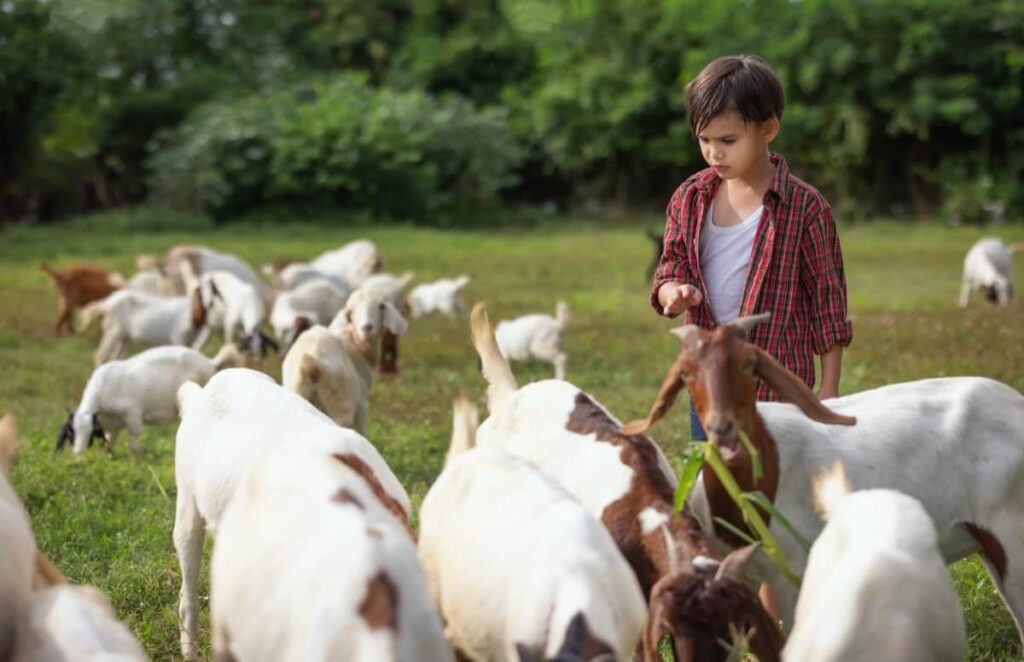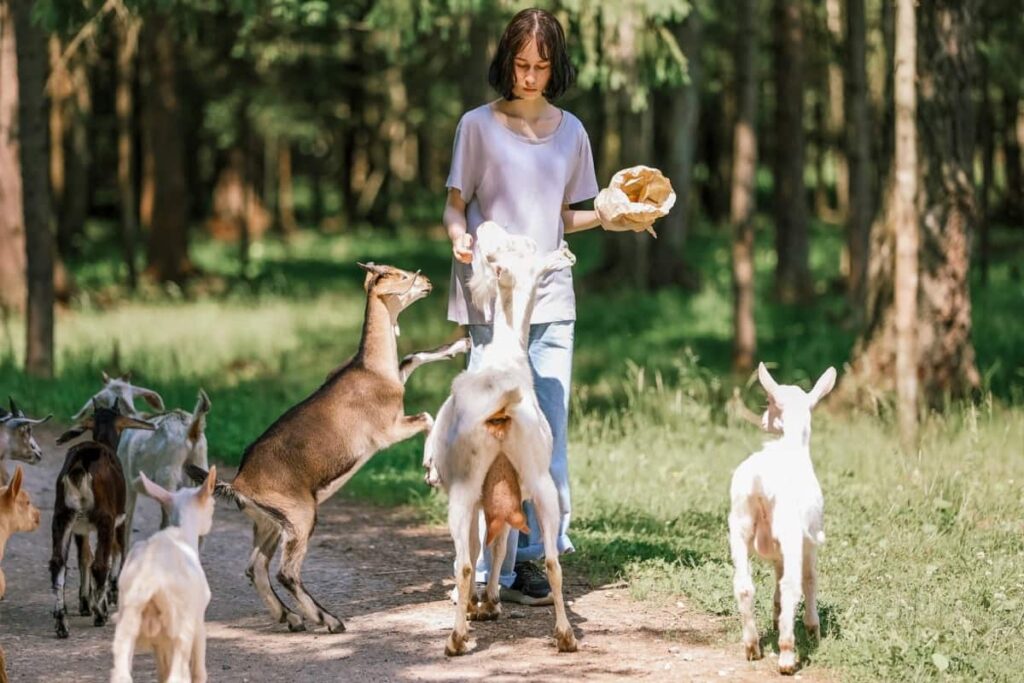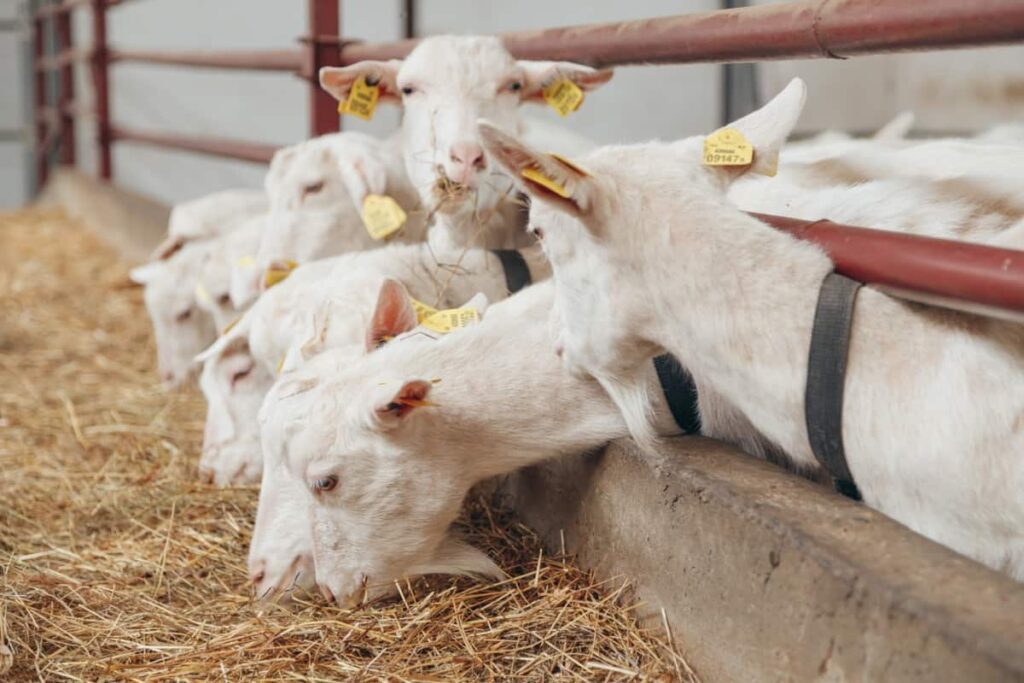Raising goats can be a fulfilling and profitable venture for beginners. Goat farming is the practice of raising goats for their meat, milk, and other resources. In recent years, goat farming has gained popularity among beginners due to its low start-up costs compared to other livestock.

Beginners Goat Farming
Different Types of Goats for Beginners
- Dairy goats: As the name suggests, these goats produce milk in large quantities. They come in various breeds, such as Saanen, Alpine, and Nubian. Dairy goats will be perfect for starting a goat cheese business or selling fresh milk.
- Meat goats: They are raised specifically for their meat production. Popular breeds include Boer and Kiko because they grow quickly and produce high-quality meat.
- Fiber goats: These goats produce Mohair or Cashmere wool used in clothing production. The Angora breed produces Mohair, while Cashmere comes from various types, such as Changthangi and Gaddi Goat.
- Pet goats: Some people keep goats as pets because they’re friendly animals with great personalities. Pygmy or Nigerian Dwarf Goat is known to be excellent pet goats because they are smaller than other breeds.
Housing and Fencing Considerations for Goat Framing
- These are essential aspects of goat farming that must be considered before starting a goat farm. The appropriate shelter is necessary to keep the goats safe, healthy, and happy. To prevent diseases, a good goat house should have proper ventilation, insulation, and flooring.
- The size of the housing unit depends on the number of goats you plan to raise. It’s also important to provide sufficient lighting for your goats to help regulate their breeding cycle.
- Goats are social animals that thrive on attention and care from their owners. Successful goat farming requires dedication and commitment from farmers who must provide proper feeding, housing, and disease prevention measures.
- Fencing is another crucial factor in keeping your goats safe from predators like dogs or coyotes that could attack them at night. Electric fencing prevents these animals from approaching too closely without harming them.
Requirements for Starting a Goat Farm
- It would help to have enough land for the number of goats you want to raise. Each goat requires at least 10 square feet of grazing area and shelter. You must also ensure that your property has proper zoning permits for livestock farming.
- Next, you will need fencing to keep your goats contained and predators out. A sturdy fence made from materials like woven wire or electric wire is recommended. Goat-proof gates are also essential in keeping them safe.
- Another important requirement is equipment such as feeding troughs, water buckets or automatic waterers, and milking stands if planning on selling milk products.
- Lastly, you should be prepared financially since starting a goat farm can be expensive, such as purchasing goats, veterinary care, fencing, and feeding.
In case you missed it: Goat Breeding and Genetics for Improved Productivity and Disease Resistance

Feeding and Nutrition Requirements for Goat Farming
- Proper nutrition is important for the health of your goats. The nutritional requirements of goats vary depending on their age, breed, weight, and production level. A balanced diet should include hay or pasture, grains, minerals, vitamins, and water.
- Hay is an important source of fiber in a goat’s diet. Good quality grass hay or legume hay should be available at all times.
- Grains are also essential to meet the energy requirements of goats. Corn, oats, barley, or soybean meal can be fed to them in small quantities daily. However, overfeeding grains might cause digestive issues.
- Water is another critical element in feeding your goat because it helps regulate body temperature and aid digestion while keeping them hydrated throughout the day, especially during hot weather conditions.
Goat Farm Care and Management
- Provide a balanced diet: Goats require a balanced diet that includes roughage, grains, and minerals. Ensure they have access to clean water at all times.
- Keep them sheltered: Build or buy adequate housing with enough space for the number of goats you have; it should also protect them from harsh weather conditions.
- Regular veterinary check-ups: Schedule regular visits with a veterinarian who can help diagnose any health issues early on and prevent outbreaks among your herd.
- Maintain cleanliness: Clean the goat’s living area regularly to avoid mold growth, parasites, or infections that could harm your animal’s health.
- Exercise and socialization: Allow your goats time outside to graze and interact with other animals or humans as part of their mental stimulation needs.
- Basic grooming practices: Trim hooves regularly to prevent infections or injuries caused by overgrown nails.
Goat Health Care Tips
- One of the most important steps in goat health care is vaccination. Vaccines protect against common diseases like Tetanus, Clostridium perfringens types C and D, Pasteurella multocida, and more. When you acquire new goats, please consult a veterinarian to create an appropriate vaccine schedule based on their age and risk factors.
- Always provide clean water and high-quality hay or forage to meet their dietary needs.
- Regular hoof trimming should also be part of your routine maintenance plan since it prevents foot rot and other issues caused by overgrown hooves. Good sanitation practices such as cleaning pens regularly are also essential because they reduce the incidence of bacterial infections among your animals.
- Watch out for any signs of illness, such as coughing, diarrhea, or lethargy that may indicate underlying problems requiring veterinary attention. Remember that early detection leads to faster recovery times saving time & money while keeping your herd healthy.
Marketing and Profitability for Successful Goat Farming
- After successfully starting a goat farm, it is essential to consider marketing and profitability. One of the significant factors that affect the profitability of goat farming is the market demand for goat products. Therefore, before starting your farm, you must research and identify potential buyers in your area or beyond.
- You can market your goats through online platforms such as social media, classified ads websites, or attend farmers’ markets with fresh produce. Additionally, supply your customers with high-quality meat, milk, and cheese from healthy goats to ensure they keep coming back.
- Another critical factor in ensuring profitability in goat farming is reducing production costs while maintaining quality standards. This can be achieved by optimizing feed formulations based on specific needs and avoiding overfeeding.
In case you missed it: Building a Cheap Goat Shed: A Beginners Guide for Budget-Friendly Goat House

Conclusion
Goat farming is a popular agricultural practice involving raising goats for milk, meat, fiber, or pets. It’s an ideal business venture for beginners due to the low start-up costs and high demand for goat products. Good management practices can lead to higher milk production or meat yield productivity.
- Goat Milking Practices and Equipment: A Beginner’s Guide
- Goat Farming for Fiber: Producing Mohair and Cashmere
- Maximizing Goat Milk Production: Tips for Dairy Goat Farmers
- Goat Farming as a Family Business: Strategies for Success
- Profitable Kenya Goat Breeds for Commercial Dairy and Meat Business
- Unlock the Secrets of Oberhasli Goat: Discover Raising and Management Practices
- Ultimate Guide to Myotonic Goats: Explore Profile to Raising
- Unlock the Secrets of Rove Goat: Discover Management Practices
- Ultimate Guide to Malwa Goat: Explore from Origin to Management Practices
Dear Sir,
Have a nice day.
I am from Kerala. We have 15 acres of land in Thirunalveli, Thamil Nadu. We would like to start a Goat farm business.
Actually, I don’t have any knowledge in this field. Hope you can help me to know and arrange Training/project report/
and all other necessary things.
Thank You.
Santhosh Kumar
Yes, Brighter Live Stock is the best goat farming company to Make Great Farm and Great Business…..